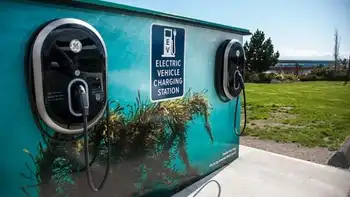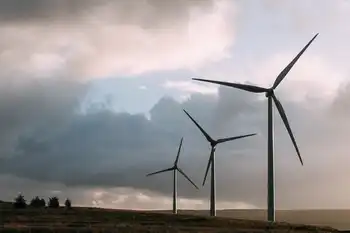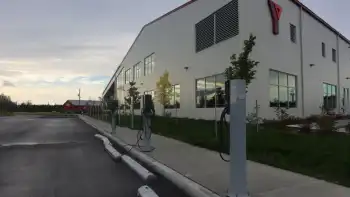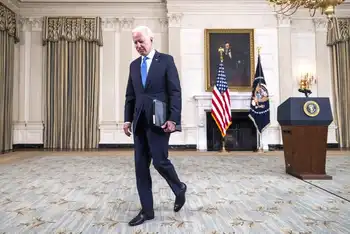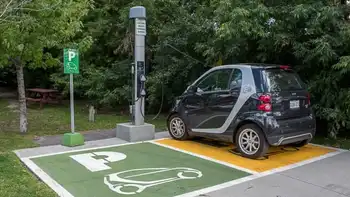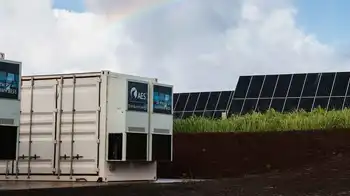Clean Electricity Standard drives Biden's infrastructure, grid decarbonization, and utility mandates, leveraging EPA regulation, renewables, nuclear, and carbon capture via reconciliation to reach 80% clean power by 2030 amid partisan Congress.
Key Points
A federal mandate to reach 80% clean U.S. power by 2030 using incentives and EPA rules to speed grid decarbonization.
✅ Targets 80% clean electricity by 2030 via Congress or reconciliation
✅ Mix of renewables, nuclear, gas with carbon capture allowed
✅ Backup levers: EPA rules, incentives, utility planning shifts
The true measure of President Biden’s climate ambition may be the clean electricity standard he tucked into his massive $2.2 trillion infrastructure spending plan.
Its goal is striking: 80% clean power in the United States by 2030.
The details, however, are vague. And so is Biden’s plan B if it fails—an uncertainty that’s worrisome to both activists and academics. The lack of a clear backup plan underscores the importance of passing a clean electricity standard, they say.
If the clean electricity standard doesn’t survive Congress, it will put pressure on the need to drive climate policy through targeted spending, said John Larsen, a power system analyst with the Rhodium Group, an economic consulting firm.
“I don’t think the game is lost at all if a clean electricity standard doesn’t get through in this round,” Larsen said. “But there’s a difference between not passing a clean electricity standard and passing the right spending package.”
In his few months in office, Biden has outlined plans to bring the United States back into the international Paris climate accord, pause oil and gas leasing on public lands, boost the electric vehicle market, and target clean energy investments in vulnerable communities, including plans to revitalize coal communities across the country, most affected by climate change.
But those are largely executive orders and spending proposals—even as early assessments show mixed results from climate law—and unlikely to last beyond his administration if the next president favors fossil fuel usage over climate policy. The clean electricity standard, which would decarbonize 80% of the electrical grid by 2030, is different.
It transforms Biden’s climate vision from a goal into a mandate. Passing it through Congress makes it that much harder for a future administration to undo. If Biden is in office for two terms, the United States would see a rate of decarbonization unparalleled in its history that would set a new bar for most of the world’s biggest economies.
But for now, the clean electricity standard faces an uncertain path through Congress and steep odds to getting enacted. That means there’s a good chance the administration will need a plan B, observers said.
Exactly what kind of climate spending can pass Congress is the very question the White House and congressional Democrats will be working on in the next few months, including upgrades to an aging power grid that affect renewables and EVs, as the infrastructure bill proceeds through Congress.
Negotiations are fraught already. Congress is almost evenly split between a party that wants to curtail the use of fossil fuels and another that wants to grow them, and even high energy prices have not necessarily triggered a green transition in the marketplace.
Senate Minority Leader Mitch McConnell (R-Ky.) said last week that “100% of my focus is on stopping this new administration.” He made similar comments at the start of the Obama administration and blocked climate policy from getting through Congress. He also said last week that no Republican senators would vote for Biden’s infrastructure spending plan.
A clean electricity standard has been referred to as the “backbone” of Biden’s climate policy—a way to ensure his policies to decarbonize the economy outlast a future president who would seek to roll back his climate work. Advocates say hitting that benchmark is an essential milestone in getting to a carbon-free grid by 2035. Much of President Obama’s climate policy, crafted largely through regulations and executive orders, proved vulnerable to President Trump’s rollbacks.
Biden appears to have learned from those lessons and wants to chart a new course to mitigate the worst effects of climate change. He’s using his majority in the House and Senate to lock in whatever he can before the 2022 midterms, when Democrats are expected to lose the House.
To pass a clean electricity standard, virtually every Democrat must be on board, and even then, the only chance of success is to pass a bill through the budget reconciliation process that can carry a clean electricity standard. Some Senate Democrats have recently hinted that they were willing to split the bill into pieces to get it through, while others are concerned that although this approach might win some GOP support on traditional infrastructure such as roads and bridges, it would isolate the climate provisions that make up more than half of the bill.
The most durable scenario for rapid electricity-sector decarbonization is to lock in a bipartisan clean electricity standard into legislation with 60 votes in the Senate, said Mike O’Boyle, the director of electricity policy for Energy Innovation. Because that’s highly unlikely—if not impossible—there are other paths that could get the United States to the 80% goal within the next decade.
“The next best approach is to either, or in combination, pursue EPA regulation of power plant pollution from existing and new power plants as well as to take a reconciliation-based approach to a clean electricity standard where you’re basically spending federal dollars to provide incentives to drive clean electricity deployment as opposed to a mandate per se,” he said.
Either way, O’Boyle said the introduction of the clean electricity standard sets a new bar for the federal government that likely would drive industry response even if it doesn’t get enacted. He compared it to the Clean Power Plan, Obama’s initiative to limit power plant emissions. Even though the plan never came to fruition, because of a Clean Power Plan rollback, it left a legacy that continues years later and wasn’t negated by a president who prioritized fossil fuels over the climate, he said.
“It never got enacted, but it still created a titanic shift in the way utilities plan their systems and proactively reposition themselves for future carbon regulation of their electricity systems,” O’Boyle said. “I think any action by the Biden administration or by Congress through reconciliation would have a similar catalytic function over the next couple years.”
Some don’t think a clean electricity standard has a doomed future. Right now, its provisions are vague. But they can be filled in in a way that doesn’t alienate Republicans or states more hesitant toward climate policy, said Sally Benson, an engineering professor at Stanford University and an expert on low-carbon energy systems. The United States is overdue for a federal mandate that lasts through multiple administrations. The only way to ensure that happens is to get Republican support.
She said that might be possible by making the clean electricity standard more flexible. Mandate the goals, she said, not how states get there. Going 100% renewable is not going to sell in some states or with some lawmakers, she added. For some regions, flexibility will mean keeping nuclear plants open. For others, it would mean using natural gas with carbon capture, Benson said.
While it might not meet the standards some progressives seek to end all fossil fuel usage, it would have a better chance of getting enacted and remaining in place through multiple presidents, she said. In fact, a clean electricity standard would provide a chance for carbon capture, which has been at the center of Republican climate policy proposals. Benson said carbon capture is not economical now, but the mandate of a standard could encourage investments that would drive the sector forward more rapidly.
“If it’s a plan that people see as shutting the door to nuclear or to natural gas plus carbon capture, I think we will face a lot of pushback,” she said. “Make it an inclusive plan with a specific goal of getting to zero emissions and there’s not one way to do it, meaning all renewables—I think that’s the thing that could garner a lot of industrial support to make progress.”
In addition to industry, Biden’s proposed clean electricity standard would drive states to do more, said Larsen of the Rhodium Group. Several states already have their own version of a clean energy standard and have driven much of the national progress on carbon emissions reduction in the last four years, he said. Biden has set a new benchmark that some states, including those with some of the biggest economies in the United States, would now likely exceed, he said.
“It is rare for the federal government to get out in front of leading states in clean energy policy,” he said. “This is not usually how climate policy diffusion works from the state level to the federal level; usually it’s states go ahead and the federal government adopts something that’s less ambitious.”
Related News
